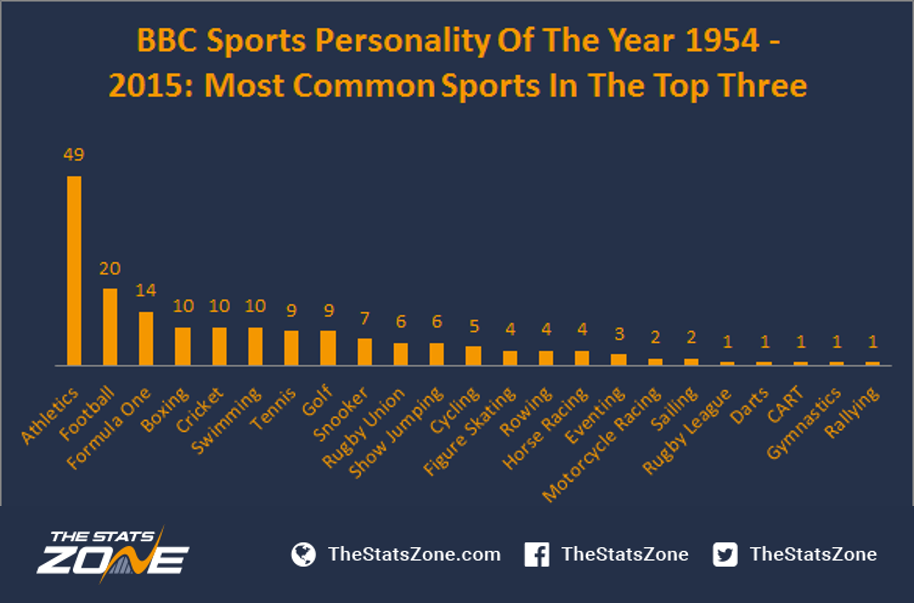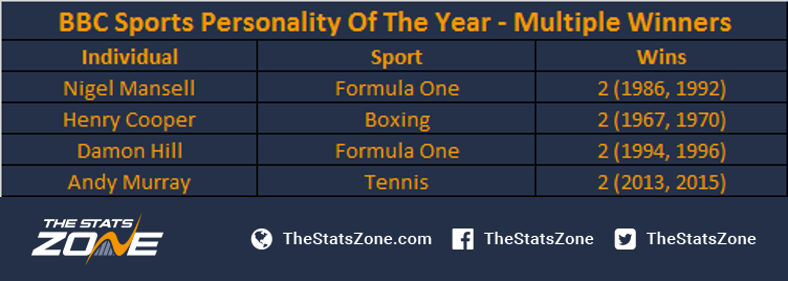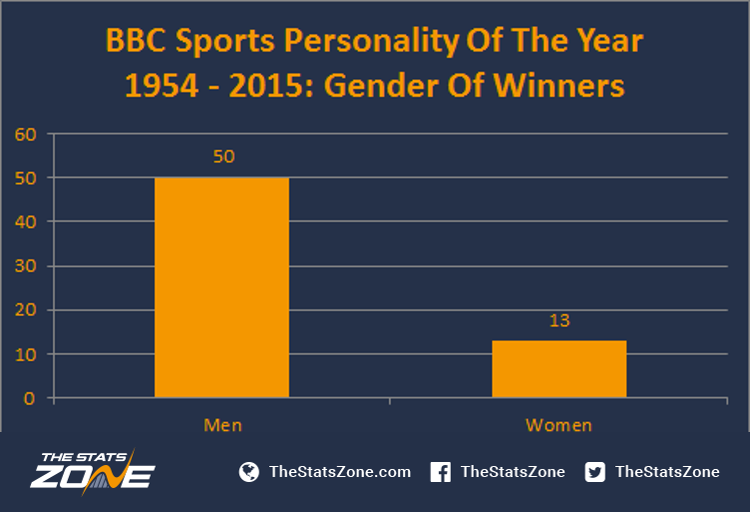Historical Trends In The BBC Sports Personality Of The Year
On Sunday 18th December 2016 the annual BBC Sports Personality of the Year event will take place at the Genting Arena in Birmingham. The standard set by the sportsmen and sportswomen from Britain this year has been phenomenal and the nominees for the main award this time are as follows:
Nicola Adams - Boxing, Gareth Bale - Football, Alistair Brownlee - Triathlon, Sophie Christiansen - Equestrian, Kadeena Cox - Athletics/Cycling, Mo Farah - Athletics, Jason Kenny - Cycling, Laura Kenny - Cycling, Andy Murray - Tennis, Adam Peaty - Swimming, Kate Richardson-Walsh - Hockey, Nick Skelton - Equestrian, Dame Sarah Storey - Cycling, Jamie Vardy - Football, Max Whitlock - Gymnastics, Danny Willett - Golf.
Here at TSZ we thought we’d take a look back at the historical trends relating to the BBC Sports Personality of the Year award since it began back in 1954; we shall investigate the common sports that make it into the top three, the most common sports to win, a look at any multiple winners, the gender of winners and the nationalities of winners.
Firstly, we shall look into the most common sports to be placed in the top three:

- By far the most common sport to be placed in the top three is athletics – the 49 occasions athletics has been represented in the top three means it has more than double the amount of placings than second placed football with 20. Of course, athletics encompasses a wide variety of disciplines so this is perhaps not such a surprising result.
- The award has often recognised the brilliance of Formula One drivers across the years, with drivers from the sport being placed in the top three on 14 occasions – third on the overall list.
- Looking at this year’s nominees; Max Whitlock and Kate Richardson-Walsh may not be overly optimistic about their chances when you consider only once has a gymnast placed in the top three (Beth Tweddle – third in 2006), whilst hockey has never been placed.
Now for a look at the most common sports to have won the award:

- Similar to the top three, athletics comes out on top with 17 winners, whilst Formula One (seven) and football (five) swap places. Boxing and tennis come in joint-third with five winners apiece.
- Just below these sports we see cycling (four); Great Britain’s affection towards cyclists has massively grown in recent times, with three of the four winners coming in the last eight years (Chris Hoy, Mark Cavendish and Sir Bradley Wiggins). This bodes well for Laura Kenny, Jason Kenny, Kadeena Cox and Dame Sarah Storey this time around – who all excelled in a cycling discipline at the 2016 Olympic and Paralympic games.
- Talking of the Olympics, when we look back at the last four Olympic cycles we do see a trend emerging. In the year 2000 Steve Redgrave’s heroics in Sydney saw him earn the award, 2004 saw double Olympic champion Kelly Holmes win, 2008 saw Chris Hoy’s extraordinary performance in Beijing recognised, whilst in 2012 Tour de France winner Bradley Wiggins also won the men’s time trial at the Olympics in London.
Next up we shall move on to multiple winners – who has claimed the award more than once?

- Only four people have won the award on more than one occasion. This year, Andy Murray can become the first person to claim an unprecedented third award, with the Scot having enjoyed the best professional year of his career.
- Snooker legend Steve Davis has feature the most inside the top three (five times), but he won the award only once in 1988, finishing second twice and third on the other two occasions.
- The recently retired athlete Jessica Ennis-Hill holds the unfortunate record of the most podiums without a win (four).
With the athlete being a brilliant role model for women, combined with the fact that all the above multiple winners are male, this leads us to explore the gender gap amongst the winners:

*Despite there only being 62 awards so far, there are 63 individuals shown with Torvill and Dean counted separately despite jointly winning the award in 1984.
- We can see the staggering difference between male and female winners over the years, with men having won 50 times compared to just 13 female winners. The last woman to win this award was Zara Tindall (then Phillips) back in 2006.
- The most successful time period for women was in the 1960’s where females won on four occasions courtesy of Anita Lonsbrough, Dorothy Hyman, Mary Rand and Ann Jones.
Finally, we decided to take a look at the nations to have won the award:

*Here Torvill and Dean have been counted as one win with both being English. Other side notes are that Greg Rusedski and Sir Bradley Wiggins have been included as English despite being born in Canada and Belgium respectively.
- England, unsurprisingly, come out on top with 48 award wins. Scotland is the best of the rest on six wins, with Andy Murray hoping to contribute further this year. Proud Manx man Mark Cavendish is the sole winner for the Isle of Man in 2011.
- On only one occasion since the event began has England failed to have an individual inside the top three (2013: first – Andy Murray, second – Leigh Halfpenny, third – Tony McCoy).
This year, Andy Murray is the favourite with the bookmakers to retain the title; the Scotsman won his second Wimbledon title, won Olympic Gold (as mentioned previously, success at the Olympics has been favoured by voters in the last four Olympic cycles), won the ATP World Tour Finals and to top it off ended the year as the World No.1. Surely victory for the tennis players is inevitable again this year?











